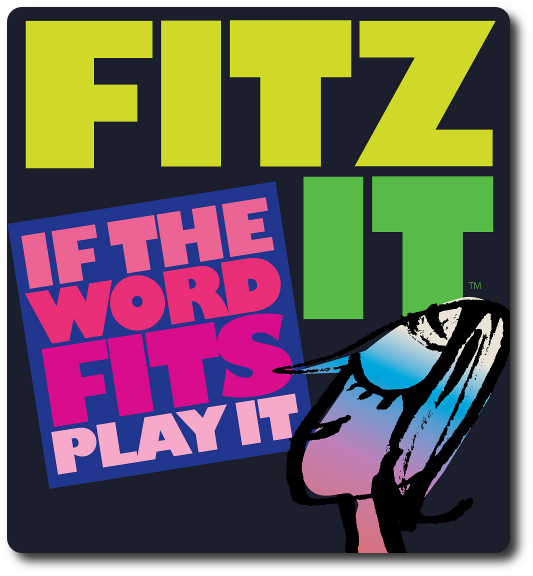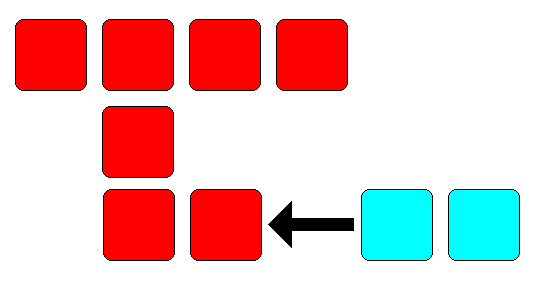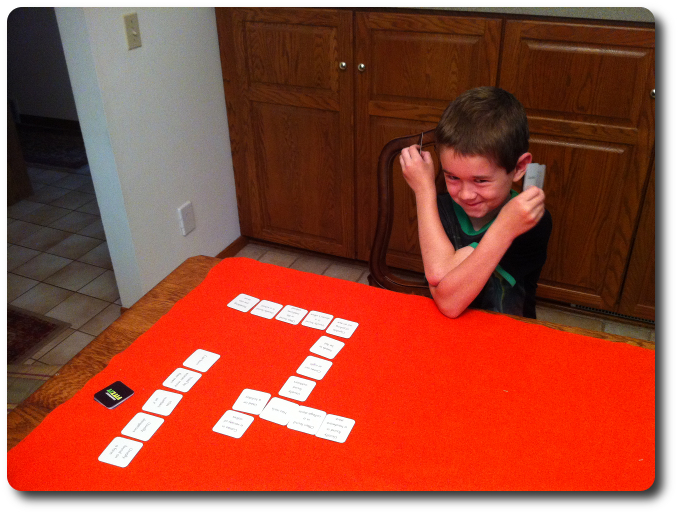
The Basics:
- For ages 10 and up
- For 2 or more players
- About 15 minutes to complete
Geek Skills:
- Active Listening & Communication
- Logical Decision Making
- Reading
Learning Curve:
- Child – Moderate
- Adult – Easy
Theme & Narrative:
- None
Endorsements:
- Gamer Geek rejected!
- Parent Geek approved!
- Child Geek rejected!
Overview
FitzIt, by Gamewright, is a word game where the players attempt to match short, descriptive cards to a specific person, place, or thing (a tangible noun), using all the cards they can. Players can build off other players’ cards, but can not share the same noun previously used. The game is a race, of sorts, and challenges the players to use as many cards as they can as quickly as they can. The more cards a player uses, the faster they get to the finish line and, possibly, penalize the other players!
FitzIt is comprised of 256 small, square cards that have a very short descriptive phrase on them. For example, “often found in a basement”. There is nothing more to the game which means the box is exceedingly small and can be easily packed in the car for camping or car trips, be they extended or a short journey to a friend’s house.
Game Set Up
To set up the game, shuffle the 256 cards and deal to each player 15, face-down. The reaming cards stay in the box and are set aside. Randomly select one of the cards from the box and place in the center of the playing area, face-up. All the players should deal the first 5 cards from the top of their 15-card stack and hold them in their hand, but always keeping them hidden from the other players.
Select a first player and begin your game!
Word It Up
FitzIt is a game about word association. Or, better put, a single noun that shares properties that are described by the cards. The player, on their turn, will review their 5 cards and attempt to associate a noun with as many of the cards as they can in addition to at least one card already in play. Once they have a word in mind, they say the word out-loud and then place one or more of their cards on the table, attaching to an existing card already in play that describes an aspect of the noun.
Cards played must always be attached to another card that further describes the noun. The cards “attach” horizontally or vertically, but never diagonally. Any card that is attached is part of the descriptive for the noun the player selects. Players must also come up with their own words and can never reuse a word already used, even if they build off the same column or row.
For example, the player selects the word “dog” and has two cards that have “can run outside” and “can be a friend”. The previous word was “man”, so the player is not breaking any rules. The player decides to attach these two cards to two already played cards that can also be used to describe a dog. They play them to the table and their turn is over.

Example of play: the player places two cards to the table, attaching them to two other cards that further describe their selected noun
One the player’s turn is over, they draw up to five cards, using the cards dealt to them in the game from their own stack.
Optionally, if a player does not want to play any of their cards or cannot play any of their cards, they can discard as many as they like and draw new cards from the box.
Word Power
If a player should ever place four or five of their cards to the table, they are awarded for their awesomeness. If they play four out of five cards, they can give their remaining card to any player they like. Play all five cards, the player takes two cards from the top of their stack and gives them to any player or players they like.
Additionally, if a player is able to add one or more cards to an existing row of four or more cards, for every card they play, they can give that many cards away to another player or players!
Challenges
Players are expected to play cards that can be closely associated with the noun they state prior to playing their cards. If any of the other players ever consider a card played to not be correctly associated with the noun, they may challenge the player and the card that doesn’t fit. The player who placed the card can make an argument for the card in question and then all the players vote. If the majority decides the card is faulty, the player removes the card in question and places it at the bottom of their stack. If the card that does not match was already in play (on the table prior to the player’s turn), then the player must take back all the cards they have played so far. If the vote is a tie or is in the player’s favor, the card or cards stay.
Winning the Game
The first player to play all their cards wins the game!
Game Variant
Optionally, if a longer game is desired, deal to each player 20 cards. This will increase the length of the game, but not the difficulty.
To learn more about FitzIt, see the game’s official web page.
Prediction
For the Parent Geeks, I predict this will be a welcomed game. Any pastime that encourages reading and problem solving is always met with a smile. Child Geeks might be a bit overwhelmed at first. The goal to this game is to take a number of disconnected statements and have them coalesce around a specific thing. That “thing” is where little minds might get a bit stuck. A large vocabulary helps, of course, but little geeks might not have a word bank large enough to help them easily navigate all the possibilities.
I don’t think the Gamer Geek will like this game much. Too simple and not enough game mechanisms or depth that Gamer Geeks look for in their game play.
Teaching the game didn’t take long. My 4-year-old excused himself once he found out what the game was about, but my 7-year-old stuck to it. We had to go through several examples of play before he felt comfortable. Once he did, he was ready to go. As I shuffled and dealt the cards, I asked him what he thought of the game so far.
“Interesting game. It reminds me of a cross-word puzzle or Scrabble.” ~ Liam (age 7)
Time to give the game a try! My little geek looks a bit nervous about it, though.
Final Word
This is a word game that all but demands that the players have access to a lot of words. The more the better. The game also challenges the players to be concrete and abstract at the same time. This can be challenging to some players. The trick is to take all the cards on the table and all the cards in your hand and find a common thread. All that is necessary is making a connection with at least one of the cards on the table and one of the cards you are holding to play. The more cards you can place, the closer you are to victory. Once you add in the cross-word like element that defines how the cards are placed on the table, the game has an added level of complexity. No longer can you simply just focus on word association. The player’s available space is limited to the card placement already on the table and their proximity to each other.
For my little geek, this proved to be too much. He was having a hard time keeping his game going and not feeling lost. He had his moments, however, where things just “clicked” and he was able to play 4 or more cards at a time. Really, he did very well, but he felt less positive about it. In the end, he wasn’t happy with his experience and didn’t want to play it again.
The Parent Geeks were a very different story. They enjoyed the light challenge and the game play that allowed them to be social at the table and play a game at the same time. This was especially true when they wanted to play a game with screaming kids in the next room. Just enough game to keep them engaged and competitive but not a game that demanded 100% of their attention.
Gamer Geeks played the game once. Once. They agreed the concept was a sound one but didn’t think it was a game they would seek out and play again.

My little geek ninja shows me his moves - but his attitude towards the game never changed
Gamer Geeks, this game won’t be of much interest to you unless you and your group are really into word games. The game does provide some challenge and puzzle solving. Still, not nearly enough to make it a game I think you’ll be hunting down.
Parent Geeks, here is a game that promotes reading, critical thinking, and communication around the table. The game plays quickly and is easy to understand, but still provides enough challenge to make it a game where the players will have to think about their moves. Paying attention to the table is also a must as a player never wants to use the same word of synonyms of used words. Doing so might cost them the game and lead to frustration. Non-gamers will also enjoy this game as there isn’t much in the way of rules.
Child Geeks, this is going to be a tough call for you. If you are my son’s age (7-years-old), you can play the game but you will be outgunned by adults. If you are in the suggested age range (10-years-old and up), then the playing field between you and the adults begins to level off. Instead of trying to always play 4 or 5 cards, we suggest that you focus on small groups of cards. By doing so, you won’t feel overwhelmed and the game becomes manageable.
In the end, the Parent Geeks were the only test group who unanimously enjoyed the game. The Gamer Geeks just didn’t see it as much of a game and the little geeks we tested the game with felt a bit left behind and frustrated. It is important to note that the game does nothing to attempt to maintain a level of balance. Word games, like knowledge-based games, will always favor the player who knows more. There is nothing anyone can do to address this other than simply learning more and attempting to be more knowledge than their opponents. This is really no different than other games, but instead of learning and practicing tactics and strategy, the focus is on personal knowledge.
Who is this game for? Word geeks, obviously. FitzIt has a very strong cross-word and Scrabble like build in its game play and will challenge every players’ vocabulary. The game works just fine with mixed age groups, but individuals with a larger vocabulary will always win out. Creativity is a must as is quick thinking when attempting to connect the cards together to form a logical string.
Personally, I liked it. I am not a fan of many word games, but this one I found interesting. It has unlimited replay value and there is a different challenge each time you play it thanks to the randomization of the cards and the way the word grid is built on the table. I won’t be playing this game with my little geeks right now but I can see this getting on the table when I have friends over who are non-gamers and when my little geeks gets older. As a party game it would work, but it might be a bit too chaotic as everyone is attempting to remember which words were used, but the game is so short, it might not matter.
This game was given to Father Geek as a review copy. Father Geek was not paid, bribed, wined, dined, or threatened in vain hopes of influencing this review. Such is the statuesque and legendary integrity of Father Geek.

